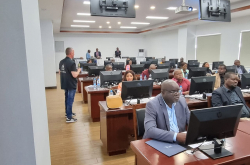Any crime which results in a profit can be used to finance terrorism. This means that a country may face terrorism finance risks even if the risk of a terrorist attack is low.
Sources of terrorist funding include, but are not limited to, low-level fraud, kidnapping for ransom, the misuse of non-profit organizations, the illicit trade in commodities (such as oil, charcoal, diamonds, gold and the narcotic “captagon”), and digital currencies.
By disrupting the flow of terrorist funding and by understanding the funding of previous attacks, we can help prevent attacks in the future.
Strategic cooperation
We maintain relationships with a number of bodies to help drive high-level policies and cooperation to counter terrorist financing:
- the Financial Action Taskforce (FATF), an intergovernmental body that develops international standards to combat money laundering and the financing of terrorism;
- FATF-style regional bodies, who disseminate best practices in their respective region;
- The Egmont Group, a network of 159 financial intelligence units from around the world.
Investigative support
On a hands-on level, we seek to encourage better cooperation between financial intelligence units (FIUs) and police in our member countries, to encourage the sharing of intelligence and analysis.
A key part of this is promoting the extension of I-24/7, our secure global police communications system, to FIUs across the world. In addition, we are championing the systematic inclusion of financial information in INTERPOL alerts related to terrorist subjects of interest.
We also advise our member countries on specific cases, connecting investigators across borders and continents, ensuring that all INTERPOL’s capabilities are used when appropriate.
Case study
The example below shows how our global network of countries, alerts and specialized support can lead to fast and concrete results in investigations.
One of our member countries in Europe requested assistance with a live terrorist financing investigation in which the suspect had financed the travel of family members and others to conflict zones by transferring funds valued circa EUR 18,000.
Our specialized officers offered advice in order to streamline the investigation and liaised with four other member countries from Africa, Americas and the Middle East where funds had been transferred.
At the request of the investigating country, INTERPOL published a Red Notice for the suspect who was subsequently arrested in another, previously unconnected, member country and extradited for prosecution.
Related documents
Related news

Border security threats focus of STOP operations in Africa
8 December 2023





